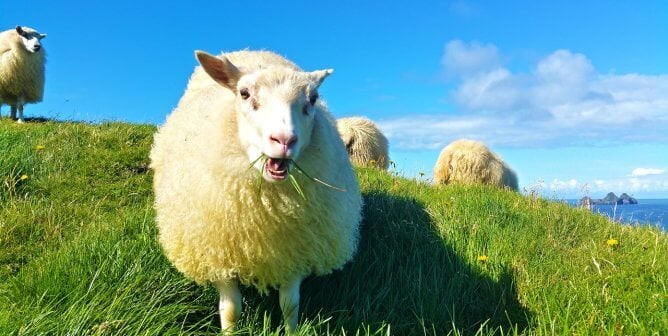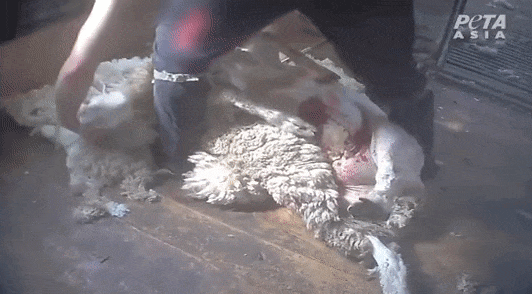5 Reasons Never to Buy Wool
The heat is on for the wool industry, and its members are sweating. Consumers are ditching wool at a fevered pace, and they’re more aware than ever before that sheep farmers are driving one of the cruelest, most environmentally damaging fiber industries.
The wool industry is now trying to greenwash its image in an attempt to prolong its inevitable demise, but we aren’t falling for it. Here are the top five reasons why you shouldn’t, either.
1. Sheep Are People.
Sheep are gentle animals who can recognize dozens of individuals from photographs, and seeing a picture of a friend can help calm them during stressful situations. But because there’s a market for their fleece and skin, they’re exploited and killed by the millions.
They’re people. They feel joy and pain, and their lives belong to them alone. Empathy for sheep and respect for their rights shouldn’t be trampled by the industrial greed that degrades and exploits them for their wool.
2. Wool Destroys the Environment.

Wool is one of the dirtiest fibers to produce. Here’s why:
- Sheep, like cows, emit large quantities of methane, contributing directly to global warming.
- Feces runoff from sheep farms contaminates local waterways.
- Farmers use sheep “dip” to prevent parasites in flocks—which has historically polluted and poisoned the land.
- The processing techniques used to prepare wool to be used in clothing involve hazardous chemicals and create toxic waste.
3. Wool Is Coated With Plastic.
The wool industry has been trying to greenwash its image by favorably comparing its product to petroleum-based synthetic materials. What a load of noncompostable garbage.
Most of the wool used in clothing is blended with plastic synthetics—compromising its ability to decompose.
And the “superwash” processing that makes wool fibers machine-washable involves coating them with plastic—meaning that even a 100% wool sweater won’t ever biodegrade normally.
4. Plants Can Do It All!
The good news is that plants can provide us with everything we need, including textiles. Here are some stars from among the ranks of plant-based materials:
- Organic cotton is grown without harmful chemicals and doesn’t destroy ecosystems. In fact, it’s known to improve soil quality. Like other vegan fabrics, organic cotton is easier to clean, faster to dry, and softer to the touch than wool.
- Hemp is a “miracle plant”—its fiber is antimicrobial, soft, and extremely durable. It’s also carbon-negative, meaning that it draws carbon dioxide out of the atmosphere.
- Linen is extremely breathable and soft, and it’s a strong thermoregulator: It keeps you cool in the heat and warm in the cold.
- Soy Cashmere is an eco-friendly fabric made from a byproduct of soybean processing. It has the softness and luster of silk, the drape and durability of cotton, and the warmth and comfort of cashmere. Best of all, it’s fully biodegradable and free of any petrochemicals.
5. Wool Production Is a Death Sentence for Sheep.
PETA entities have investigated 117 operations in the global wool industry so far, and every visit to a shearing shed has revealed horrific abuse. There’s no such thing as responsibly produced wool, and the wool industry is scrambling to hide the truth from consumers.
At the facilities PETA entities visited, workers hit, kicked, and stomped on sheep’s heads; beat them with clippers or hammers; stood on their necks; dragged them; and punched them in the face. It’s common for workers, who are typically paid by volume, to stitch up sheep’s gaping wounds hastily and crudely with needle and thread and without pain relief right on the shearing floor.
And farmers violate sheep’s bodies in other ways, too, including by breeding them to grow extreme and unnatural amounts of wool. This interference causes the sheep a host of devastating health issues. An estimated 10 million lambs in Australia die within days of birth every year.
Just Say No to Wool!
Keeping your wardrobe wool-free is the right thing to do. It’s also easy, inexpensive, and good for the planet. If you need help learning how to wear vegan, check out PETA’s Vegan Clothes Shopping Guide.
Need the extra nudge to wear vegan? Learn why wearing wool is no different from wearing fur, leather, or any other animal-derived material.





